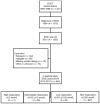Residual β cell function in long-term type 1 diabetes associates with reduced incidence of hypoglycemia
- PMID: 33529168
- PMCID: PMC7843223
- DOI: 10.1172/JCI143011
Residual β cell function in long-term type 1 diabetes associates with reduced incidence of hypoglycemia
Abstract
BACKGROUNDWe investigated residual β cell function in Diabetes Control and Complications Trial/Epidemiology of Diabetes Interventions and Complications (DCCT/EDIC) study participants with an average 35-year duration of type 1 diabetes mellitus (T1DM).METHODSSerum C-peptide was measured during a 4-hour mixed-meal tolerance test. Associations with metabolic outcomes and complications were explored among nonresponders (all C-peptide values after meal <0.003 nmol/L) and 3 categories of responders, classified by peak C-peptide concentration (nmol/L) as high (>0.2), intermediate (>0.03 to ≤0.2), and low (≥ 0.003 to ≤0.03).RESULTSOf the 944 participants, 117 (12.4%) were classified as responders. Residual C-peptide concentrations were associated with higher DCCT baseline concentrations of stimulated C-peptide (P value for trend = 0.0001). Residual C-peptide secretion was not associated with current or mean HbA1c, HLA high-risk haplotypes for T1DM, or the current presence of T1DM autoantibodies. The proportion of subjects with a history of severe hypoglycemia was lower with high (27%) and intermediate (48%) residual C-peptide concentrations than with low (74%) and no (70%) residual C-peptide concentrations (P value for trend = 0.0001). Responders and nonresponders demonstrated similar rates of advanced microvascular complications.CONCLUSIONβ Cell function can persist in long-duration T1DM. With a peak C-peptide concentration of >0.03 nmol/L, we observed clinically meaningful reductions in the prevalence of severe hypoglycemia.TRIAL REGISTRATIONClinicalTrials.gov NCT00360815 and NCT00360893.FUNDINGDivision of Diabetes Endocrinology and Metabolic Diseases of the National Institute of Diabetes and Digestive and Kidney Diseases (DP3-DK104438, U01 DK094176, and U01 DK094157).
Keywords: Autoimmunity; Diabetes; Endocrinology.
Conflict of interest statement
Figures



Comment in
-
A little help from residual β cells has long-lasting clinical benefits.J Clin Invest. 2021 Feb 1;131(3):e143683. doi: 10.1172/JCI143683. J Clin Invest. 2021. PMID: 33529163 Free PMC article.
Similar articles
-
Insulin secretion measured by stimulated C-peptide in long-established Type 1 diabetes in the Diabetes Control and Complications Trial (DCCT)/ Epidemiology of Diabetes Interventions and Complications (EDIC) cohort: a pilot study.Diabet Med. 2014 Oct;31(10):1264-8. doi: 10.1111/dme.12504. Epub 2014 Jun 9. Diabet Med. 2014. PMID: 24836354 Free PMC article. Clinical Trial.
-
Effect of intensive therapy on residual beta-cell function in patients with type 1 diabetes in the diabetes control and complications trial. A randomized, controlled trial. The Diabetes Control and Complications Trial Research Group.Ann Intern Med. 1998 Apr 1;128(7):517-23. doi: 10.7326/0003-4819-128-7-199804010-00001. Ann Intern Med. 1998. PMID: 9518395 Clinical Trial.
-
Beta-cell function and the development of diabetes-related complications in the diabetes control and complications trial.Diabetes Care. 2003 Mar;26(3):832-6. doi: 10.2337/diacare.26.3.832. Diabetes Care. 2003. PMID: 12610045
-
[C-peptide residual secretion makes difference on type 1 diabetes management?].Arq Bras Endocrinol Metabol. 2008 Mar;52(2):322-33. doi: 10.1590/s0004-27302008000200020. Arq Bras Endocrinol Metabol. 2008. PMID: 18438543 Review. Portuguese.
-
Impaired beta-cell and alpha-cell function in African-American children with type 2 diabetes mellitus--"Flatbush diabetes".J Pediatr Endocrinol Metab. 2002 Apr;15 Suppl 1:493-501. J Pediatr Endocrinol Metab. 2002. PMID: 12017222 Review.
Cited by
-
A standardized metric to enhance clinical trial design and outcome interpretation in type 1 diabetes.Nat Commun. 2023 Nov 8;14(1):7214. doi: 10.1038/s41467-023-42581-z. Nat Commun. 2023. PMID: 37940642 Free PMC article.
-
Residual β-cell function in Brazilian Type 1 diabetes after 3 years of diagnosis: prevalence and association with low presence of nephropathy.Diabetol Metab Syndr. 2023 Mar 20;15(1):51. doi: 10.1186/s13098-023-01014-z. Diabetol Metab Syndr. 2023. PMID: 36935525 Free PMC article.
-
Predictive Value of C-Peptide Measures for Clinical Outcomes of β-Cell Replacement Therapy in Type 1 Diabetes: Report From the Collaborative Islet Transplant Registry (CITR).Diabetes Care. 2023 Apr 1;46(4):697-703. doi: 10.2337/dc22-1155. Diabetes Care. 2023. PMID: 36657975 Free PMC article.
-
Precision medicine in type 1 diabetes.Diabetologia. 2022 Nov;65(11):1854-1866. doi: 10.1007/s00125-022-05778-3. Epub 2022 Aug 22. Diabetologia. 2022. PMID: 35994083 Free PMC article. Review.
-
Rational Engineering of Islet Tolerance via Biomaterial-Mediated Immune Modulation.J Immunol. 2024 Jan 15;212(2):216-224. doi: 10.4049/jimmunol.2300527. J Immunol. 2024. PMID: 38166244 Free PMC article. Review.
References
-
- McGee P, et al. Insulin secretion measured by stimulated C-peptide in long-established Type 1 diabetes in the Diabetes Control and Complications Trial (DCCT)/ Epidemiology of Diabetes Interventions and Complications (EDIC) cohort: a pilot study. Diabet Med. 2014;31(10):1264–1268. doi: 10.1111/dme.12504. - DOI - PMC - PubMed
Publication types
MeSH terms
Substances
Associated data
Grants and funding
LinkOut - more resources
Full Text Sources
Other Literature Sources
Medical
Research Materials

